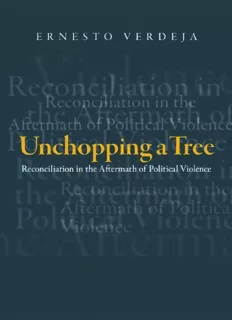
Unchopping a tree: reconciliation in the aftermath of political violence PDF
Preview Unchopping a tree: reconciliation in the aftermath of political violence
Unchopping a Tree In The Series Politics, History, and Social Change, edited by John C. Torpey Also in this series: Rebecca Jean Emigh, The Undevelopment of Capitalism: Sectors and Markets in Fifteenth- Century Tuscany Aristide R. Zolberg, How Many Exceptionalisms? Explorations in Comparative Macroanalysis Thomas Brudholm, Resentment’s Virtue: Jean Améry and the Refusal to Forgive Patricia Hill Collins, From Black Power to Hip Hop: Racism, Nationalism, and Feminism Daniel Levy and Natan Sznaider, translated by Assenka Oksiloff, The Holocaust and Memory in the Global Age Brian A. Weiner, Sins of the Parents: The Politics of National Apologies in the United States Heribert Adam and Kogila Moodley, Seeking Mandela: Peacemaking Between Israelis and Palestinians Marc Garcelon, Revolutionary Passage: From Soviet to Post- Soviet Rus sia, 1985– 2000 Götz Aly and Karl Heinz Roth, translated by Assenka Oksiloff, The Nazi Census: Identifi cation and Control in the Third Reich Immanuel Wallerstein, The Uncertainties of Knowledge Michael R. Marrus, The Unwanted: Eu ro pe an Refugees from the First World War Through the Cold War ❖ Unchopping a Tree Reconciliation in the Aftermath of Political Violence Ernesto Verdeja Temple University Press Philadelphia Temple University Press 1601 North Broad Street Philadelphia PA 19122 www .temple .edu/t empress Copyright © 2009 Temple University All rights reserved Published 2009 Printed in the United States of America The paper used in this publication meets the requirements of the American National Standard for Information Sciences— Permanence of Paper for Printed Library Materials, ANSI Z39.48- 1992 Library of Congress Cataloging- in- Publication Data Verdeja, Ernesto. Unchopping a tree : reconciliation in the aftermath of po liti cal violence / Ernesto Verdeja. p. cm. — (Politics, history, and social change) Includes bibliographical references and index. ISBN 978- 1- 4399- 0054- 3 (cloth : alk. paper) 1. Po liti cal violence. 2. Social confl ict. 3. Confl ict management. 4. Reconciliation. I. Title. JC328.6.V47 2009 303.6'9—dc22 2009013156 2 4 6 8 9 7 5 3 1 ❖ Contents Ack now ledg ments vii 1 Theorizing Reconciliation 1 2 Key Normative Concepts 28 3 Po liti cal Society 66 4 Institutional and Legal Responses: Trials and 92 Truth Commissions 5 Civil Society and Reconciliation 136 6 Interpersonal Reconciliation 160 7 Conclusion 180 Notes 187 References 197 Index 221 ❖ Acknowledgments T his is a work about pol itic al reconciliation, about the need and challenges of reconciling after severe pol itic al violence. I be- came interested in this subject while living in South America as a child and seeing fi rsthand the diffi culties of engaging with a fraught past. Many years of thinking about these issues led me to graduate school, culminating in a doctoral dissertation on which this book is loosely based. I would like to thank Nancy Fraser and Courtney Jung, who provided valuable suggestions and direction on the dissertation, and Richard A. Wilson and Andrew Arato, who reminded me of the importance of retaining the connection between normative theory and practical politics in my work. Matthew Goldfeder read the text with care and pressed me on a number of points, making the argument more coherent than it otherwise would have been. His patience with my questions was matched only by the wit and clarity of his suggestions. While at Wesleyan, J. Donald Moon and Nancy Schwartz kindly read the entire manuscript and gave detailed and important feedback on the fundamental arguments. Their intellectual support and friend- ship helped me enormously in this project. At the University of Notre Dame, the Kroc Institute for International Peace Studies and the Cen- ter for the Study of Social Movements and Social Change provided fi nancial support and a wonderful environment in which to write. viii ▪ Acknowledgments I would especially like to thank Daniel Myers for securing this support and making Notre Dame such a welcoming place. A number of per- sons in Chile and Bosnia and Herzegovina kindly shared their experi- ences with me, and I am enormously grateful to them. Many thanks also go to Temple University Press and Micah Kleit for taking on this project. I dedicate this book to my parents, Martha and Ernesto, who have always encouraged me in everything I have done and showed me the beauty of learning, and to my Bettina, whose love and warmth made this long journey possible and worthwhile. Without her support, this would have been a diffi cult, lonely road. Unchopping a Tree
Description: